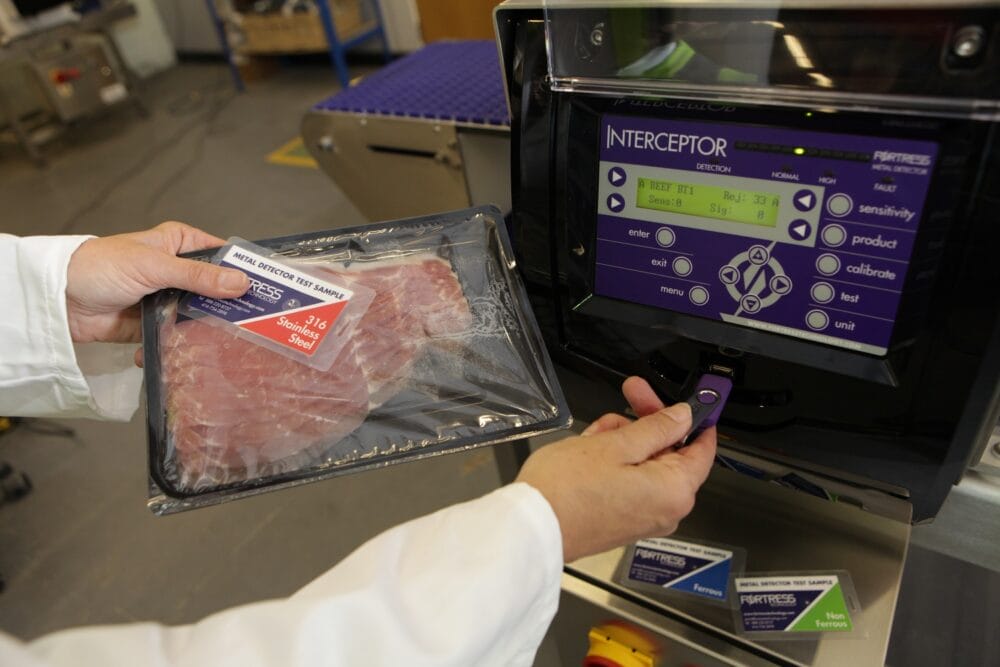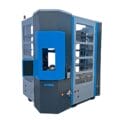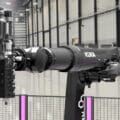Hindsight they say is a wonderful thing. But when it comes to investments in equipment that could be the mainstay of your HACCP brand protection strategy for 20+ years, having the option to act upon an afterthought is surely better?
Conscious that many food processors over the last decade have forgone the benefits of automatic testing because they were awaiting wider industry acceptance, Fortress Technology has developed a new switch-and-activate automatic testing solution. Having successfully standardised the company’s manufacturing process globally, the food safety specialist has now updated the mechanics of their metal detectors. In doing so, every customer installing a Fortress conveyor, gravity and pipeline metal detector from the past 12-months now has the choice to switch over and in less than 20 minutes benefit from automatic performance validation testing, when they and their busy schedule decides.
Developed in-house by Fortress, Halo Automatic Testing is designed to reliably and repeatably challenge detection and rejection, worst case scenarios and simulate true production conditions on their metal detectors. Before ‘Halo Ready’ food processors needed to pre-empt and specify this feature. Now, every Fortress Metal Detector has all the electronics pre-installed. Allowing for the software to be implemented in a matter of minutes to minimise production downtime and instantly start saving food processors time and money.
NON-STOP SAFETY
Hazard Analysis and Critical Control Point (HACCP) plans form the foundation to most food safety management systems. However, implementing foreign object detection systems to reduce the risk of a hazard entering the food supply is not enough to ensure total food safety.
As well as safety inspections and regular auditing, all CCP inspection systems must be regularly tested as part of GFSI, HACCP and audit QC compliance standards. These requirements recommend that every industrial food metal detector be tested using all three metal samples hourly, at the start and end of every production shift and between every product changeover. For optimal safety, the detection sensitivity of the machine should be challenged to the critical limits.
Automatic testing, supported by a digital reporting software, is the safest and most efficient way to accomplish this. Yet so many inspection processes on food production lines remain largely paper-based and are extremely labour-intensive. Even worse, these tests can be hazardous to repeatably perform manually on gravity, pipeline or bulk metal detectors. Each test can interrupt production by as much as 20 minutes, creating an abundance of product waste. Manual tests can also be prone to human error. For each one that isn’t documented properly, it’s like it never happened.
FOOD SAFETY INFLUENCERS
With their high standards for food safety and quality, most retailers and regulatory bodies look to M&S Food to assess the direction the industry is heading in and when to implement changes. “The company’s Foreign Body Prevention COP document has for over a decade defined the COP framework for virtually every UK grocery chain. As testament, the M&S Food Foreign Prevention document has been refreshed several times to specify the type of foreign object detection system food processors should use, how the system should “fail” safely, the equipment auditing process, adequate record-keeping procedures, and more,” confirms Fortress Sales Director Phil Brown.
Most recently, M&S Food became the first retailer to officially approve the benefits of Automatic Testing of inspection machines. “It is advised to have a machine that automatically records the results of testing to prevent errors or tampering with the results. This also includes the number of rejected packs each shift,” states the latest M&S Guidance for Foreign Body Prevention document.
For enhanced traceability, the updated guidance also highlights the benefits of utilising a sophisticated, network data management system to store documents electronically for fast retrieval.
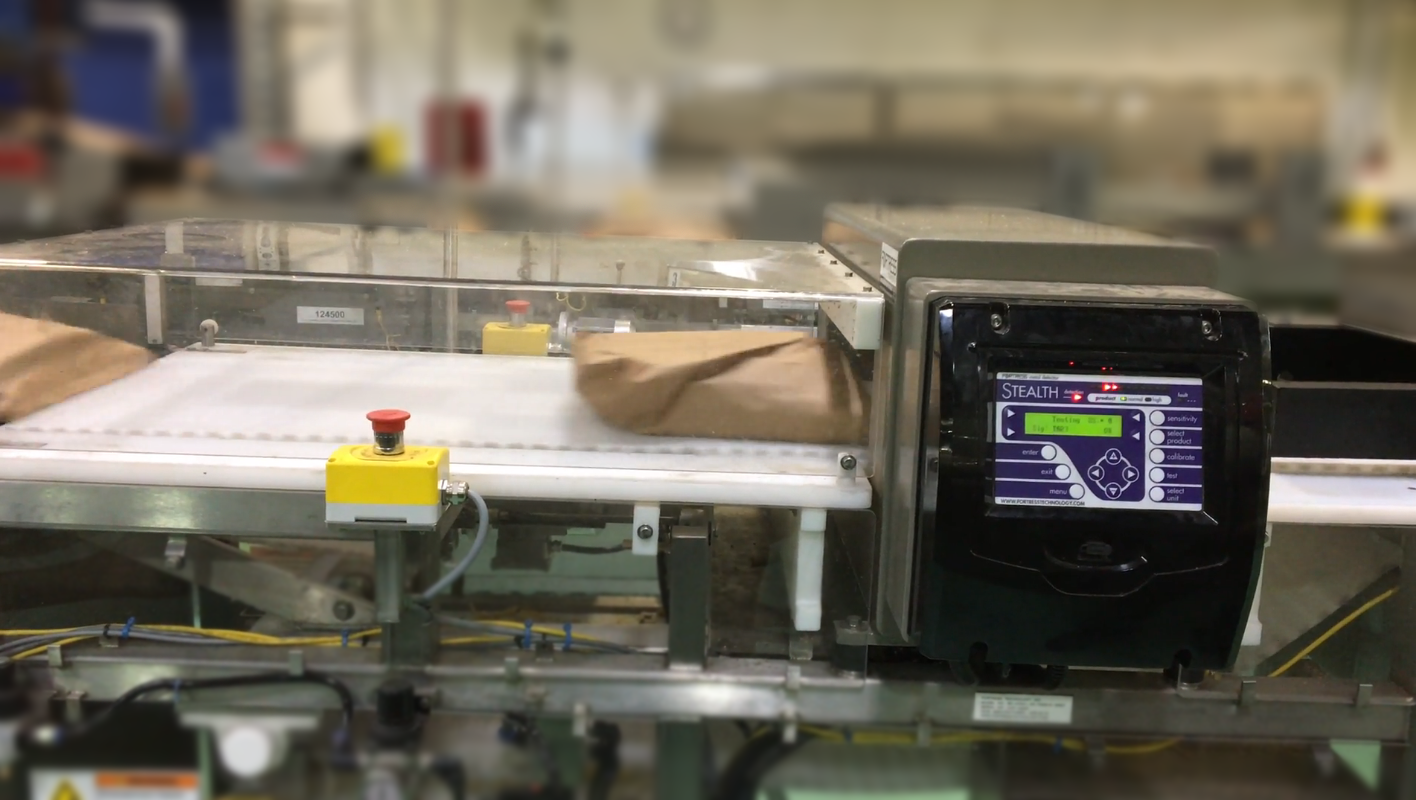
Halo Automatic Testing can validate the performance of metal detectors by testing three metal samples – ferrous, non-ferrous, and stainless steel – sometimes in multiple positions, without interrupting production.
READY, SET, GO HALO
As with most forms of automation, there are different levels. Not all ‘automatic’ testing solutions yield the same results, cautions Phil. Some require more human interventions or audible warnings than others.
As the first-ever inspection company globally to develop an automatic testing solution to measure the performance of metal detectors, Fortress has spent the last decade refining its original concept. Now, when combined with the company’s latest Contact 4.0 software, Fortress customers are able to generate testing reports across their entire metal detection machine network, including Fortress Combination metal detectors and checkweighers.
Eliminating human error and eradicating workforce H&S risks, Halo enables factory operatives to pre-program ferrous, non-ferrous and stainless steel sample tests. These can be activated remotely or selected from the HMI.
Real time GFSI audit and QC results are instantly logged without having to physically pass a metal contaminant through the exact centre of a gravity, throat, pipeline and conveyor metal detector aperture. This also means that operators no longer need to flush out test samples from product, which can get messy and increases waste, or manually complete proof of test paperwork.
“Digitising processes that have largely been paper-based is a fundamental step change in building sturdier and safer food supply chains. In particular, a data-driven approach expedites the response to production bottlenecks, upstream production errors, prevents costly recall scenarios and increases transparency,” comments Phil.
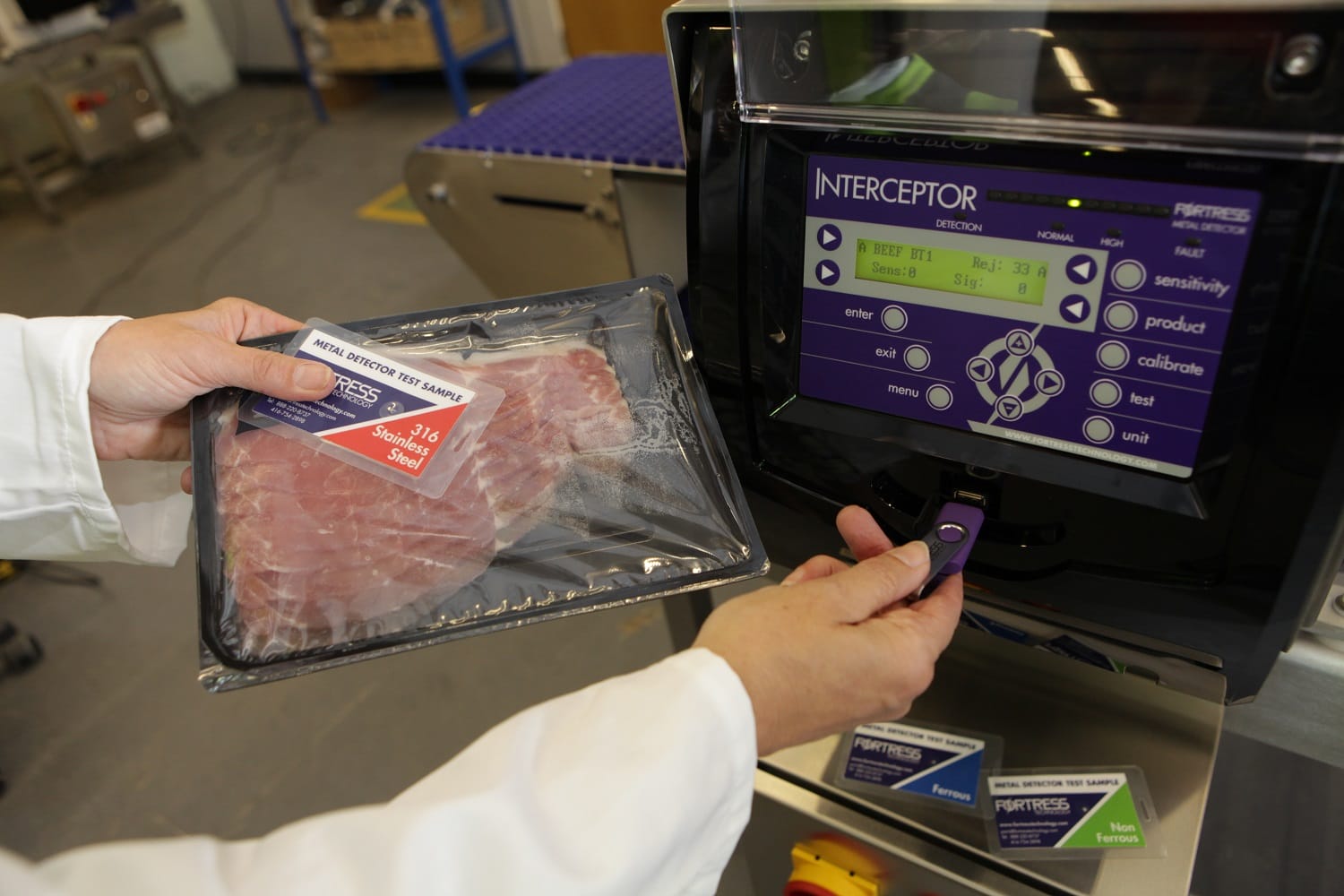
Regular testing, usually hourly, is usually required for retailer CCP-compliance.
SWITCH-AND-ACTIVATE
Activating the technologies pre-installed on existing Fortress metal detectors has proven to be an efficiency and safety gamechanger for many of the quality managers at premium flour and ingredient company Ardent Mills.
Set up on six inline conveyor packaging lines, the resulting operational savings have been rapid. Packaging Engineer Manvine Bharj estimates the ROI on the original Stealth Metal Detector investment has been achieved in six months or less. “Halo provides the perfect blend of inspection continuity, contaminant detection, machine performance and safety,” comments Manvine.
Now, with every metal detector built “Halo-Ready”, Fortress has observed that the switchover to automatic testing has increased 10 fold. “Unlike traditional metal detectors, which primarily serve to mitigate brand risk, combining our highly-sensitive Halo-Ready metal detectors with automatic testing provides tangible productivity and cost savings, in addition to strengthening food safety” affirms Phil.
For a full demonstration on how to quickly implement a safer, faster method for inspection system testing that suits your real-time food and beverage processing needs, visit Fortress Technology on our new PPMA 2024 Stand, B32.

